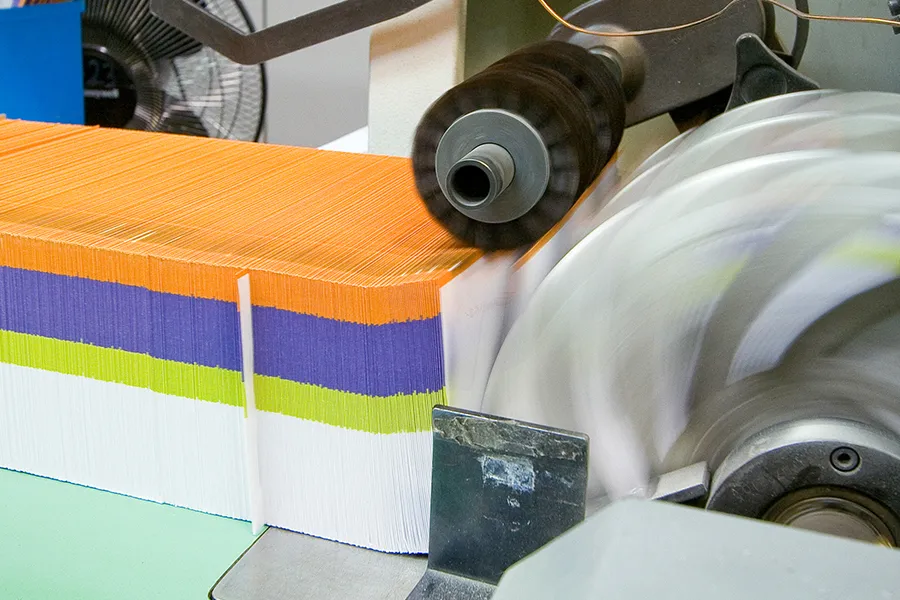The Mayer Group is one of the leading European companies in the manufacture and sale of shipping and packaging solutions. The product range comprises over 600 different envelopes, pockets and light packaging. Alongside its core business of envelopes and pockets, the Mayer Group is also establishing new segments such as lightweight packaging and new media and services in order to meet the requirements of customers in the market at all times. The Mayer Group is increasingly focusing on digital innovation and further development. With over 30 companies in 16 countries, Mayer-Kuvert-network is the largest company in the envelope industry in Europe. Across the group, around 16 billion envelopes are produced annually on 136 reel-fed and 59 sheet-fed machines. This grown structure creates high demands on the system landscape – especially for product configuration and calculation and overall, for fast CPQ processes.
Mayer Group relies on SAP® & VCPowerPack
An important and future-oriented step for the Mayer Group was the conversion of the existing ERP system landscape to SAP solutions at the German locations in 2014 and the switch to the HANA database, which paved the way for the SAP S/4HANA® transition in 2019. During the evaluation phase for the new SAP ERP implementation, it became apparent that the requirements of the complex organizational structure that had grown over time could not be met with standard SAP Variant Configuration. The Mayer Group therefore opted for Aicomp’s VCPowerPack – a configuration solution integrated in SAP, optimized for complex configuration and calculation scenarios in production.
In e-commerce, the Mayer Group opens the configuration for its end customers
With the switch to the SAP HANA® platform, further potential arose from the switch of the e-commerce platform to the SAP Commerce Cloud for Web2Print scenarios. This also increased the demands on system speed as well as on demand planning and inventory management. Web2Print means that existing envelopes are printed with a customer-specific motif in very short runs. Technically speaking, customers should choose stock products and configure an individual print on the web. This follows the proven frontloading principle in the CPQ process. The aim is to collect as much data as possible on the customer order as early as possible for process optimization, to combine it with experience from downstream areas (production, sales, etc.) in the most automated way possible, in order to take advantage of possible savings.
Requirements for the CPQ process
For the Mayer Group, the preparation of precise and highly configured quotations for the processing of individual products and small margins is essential. Precise pricing requires an exact preliminary cost calculation based on a product configuration already in the quotation phase. This also means that detailed machine and material costs must be recorded and processed – but as far as possible without a lot of user input and machine-related knowledge of the system users. Every customer-specific product, theoretically down to lot size 1, places the same complex demands on the integrated system landscape in terms of logistics processing. These include the rapid entry of product specifications, precise calculation of graduated quantities and extensive, consistent master data for processing in sales, shipping, inventory management and accounting, if possible, without further manual intervention by the system users. To ensure fast and error-free processes, the CPQ product specification should therefore be transferred as directly as possible to system master data after the customer places the order.
Requirements on the SAP system
The SAP ERP system for the Mayer Group required industry-specific and customer-specific adaptations in order to enable fast and error-free CPQ processes while at the same time considering the optimal economic factors.
The wide range of products, the technical differences in production within the individual product groups, a diverse range of machinery and, last but not least, the large number of production sites place special demands on the CPQ process. In the past, this complexity could only be managed by a few employees. The associated time-consuming determination and technical validation of production routes often represented the bottleneck in the process. The Mayer Group therefore decided to store this know-how in the SAP system using Aicomp’s VCPowerPack.
An automatic determination of possible cross-plant and cross-national production routes was realized with the help of VCPowerPack standard components. This automatic determination of production routes includes, for example, checking the technical limits of the machines, determining the planned machine times and raw material consumption, strategic considerations, and prioritizing the technically possible production routes based on various criteria.
Since the automatic determination of the production route is already carried out in the offer phase, this allows an accurate planned cost calculation, which in turn is the basis for effective pricing and contribution margin analysis.
The fully automated master data creation is triggered as soon as the customer places the order. The basis for the master data creation is the quotation entered in the CPQ process, which contains all necessary information in the VCPowerPack variant configuration, such as product specification, machine route and parts list details. The automated master data creation for possibly multi-stage and cross-plant logistics processes considerably reduces the error rate and also includes semi-finished products and purchased components.
The current system landscape
Integrated into the current SAP ERP S/4HANA, the Mayer Group relies on Aicomp’s VCPowerPack to extend the functionalities for product configuration and cost calculation. VCPowerPack contains all logical conditions for product configuration and guides the user intuitively through the product specifications. “Guard rails,” such as a traffic light system and detailed status messages ensure that only new products are configured that can actually be manufactured. Bidirectional interfaces to T.CON’s MES CAT and Esko’s CAD system make relevant production data available right from the quotation stage. The automated master data creation is handled by a module in VCPowerPack. The configuration of Web2Print customizations for the e-commerce scenarios is outsourced to the end customer via an SAP Commerce Cloud Webshop. VCPowerPack performs the necessary calculations in the background. The SAP Commerce Cloud is integrated together with the SAP Sales Cloud via the SAP Cloud Platform in SAP S/4HANA as ERP backend. This means that in the future, further application scenarios for user-based frontloading scenarios can be developed via the SAP Sales Cloud as a CRM system.
Authors
Patrick Fichtner
- Solution architect for variant configuration & discrete manufacturing in SAP ERP
- Head of Product Management – Aicomp Group
Elena Krause-Söhner
- Project manager SAP S/4HANA transition & representative for digital progress in the Mayer Group
- Head of IT-Management & Digitalisation – Mayer Group
- Website: www.mayer-kuvert-network.com/



